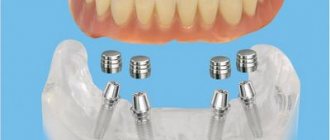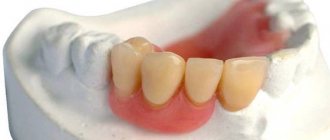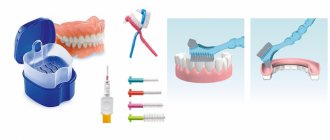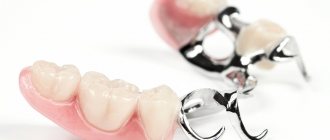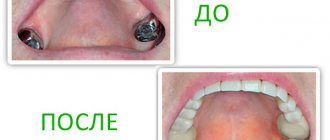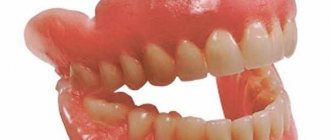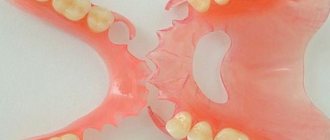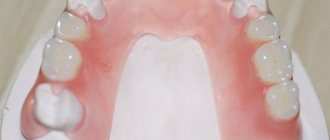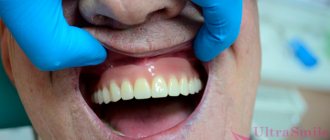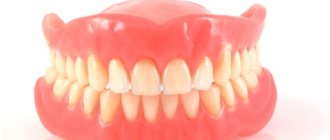Dental prosthetics are necessary in cases where it is not possible to install crowns - replacements for lost molars. There are different types of dentures, but the most reliable is the clasp denture with locks.
The locking type of clasp prosthesis is an improved design of its predecessor, the clasp-based prosthesis. Clasps are special hooks that cling to healthy teeth, which serve as a support for the prosthesis. The main disadvantage of clasps, which contributed to the development of a new type of fastening, is that they are noticeable to an outside observer, regardless of how deep the dentures are located in the oral cavity.
As you can already guess from the name, the locking type of prosthesis is secured using special locks. Each lock consists of two interlocking halves: one is attached to the prosthesis itself, and the other is attached to a special crown, which is put on the supporting healthy tooth. When installing a prosthesis, these parts of the same design tenaciously grip each other, which guarantees reliability in its fixation in the oral cavity.
When you decide to install a clasp prosthesis with locks, your doctor can recommend several types of fastening:
- Conventional locking - the supporting teeth are ground down and special crowns with a part of the locking fastening are put on them.
- Attachment - part of the lock is inserted directly into the tooth without preliminary filing, leaving it in its original form, the fastening is located inside the prosthesis and when installed, the prosthesis looks most natural.
- Telescopic - crowns of a special cone shape are installed on the supporting teeth, onto which a prosthesis is then placed, which has similar recesses in the structure at the attachment points.
The need to install a clasp prosthesis with locks is determined by the following problems:
- in the absence of three or more teeth in a row, and there is no difference between frontal and posterior teeth;
- if it is impossible to install another type of prosthesis;
- with defective dentition;
- with disorders of chewing function;
- with malocclusion;
- with a tendency to bruxism, due to which the teeth are severely worn down;
- in case of impaired diction due to lost teeth.
Clasp prosthesis with locks requires an individual approach in manufacturing, since there are no standard designs, which is due to its rather high cost. Each product is the fruit of the joint work of the attending dentist, orthopedist and dental technician. First, a cast of the jaw, upper or lower, is made, then the dental technician makes a plaster copy, and after all the necessary fittings and clarifications, the clasp prosthesis is cast. After this, a decision is made which type of locking connection will be preferable, based on both the opinion of the patient and the opinion of the attending physician. Before making metal parts (an alloy of chromium, molybdenum and cobalt or stainless steel is used), it is checked whether the patient is allergic to the source material. If there is, then the base is made from special heat-resistant plastic.
Prices for clasp dentures in Moscow. Reviews and photos
The cost of clasp dentures depends on several factors:
- Number of missing teeth.
- Mounting option.
- The scope of preliminary work on mouth sanitation, installation of inlays, etc.
The price of a clasp denture for the upper or lower jaw ranges from 30,000 rubles. Below are various implementation options - photos before and after the procedures.
Inlays for clasp dentures (with “Bredent” locks). Cost: from 3,200 rubles *
The inlay provides reliable fixation of the entire structure, but at the same time is highly aesthetic, because is completely covered when worn by removable elements of the prosthesis. Bredent locks are durable and easy to use; if necessary, the patient can easily remove the device for cleaning and then put it back in place. This design is comfortable to wear, since the load is distributed evenly when chewing.
/wp-content/uploads/2017/10/Byugelnye-protezy.mp4
The inserts do not rub, do not cause changes in diction, and allow you to take any food (including solid foods). Clasp dentures with Bredent locks are the best alternative to complete removable dentures if there are contraindications to implantation. In addition to inlays, special metal-ceramic crowns with locks can be used, which are placed on the supporting teeth (the technique is suitable when the patient has relatively healthy and intact teeth).
Clasp prosthesis with locks. Cost: from 40,000 rubles*
In addition to high reliability, such systems are characterized by excellent aesthetics and strong fixation: the structure is securely fastened, the patient does not have to worry about the structure moving while eating. From the outside, the presence of artificial structures in the mouth is completely invisible.
The manufacture and integration of a locking clasp prosthesis into the oral cavity is a more complex procedure compared to clasp prosthetics, and therefore the cost of the work is higher than when using other designs. Locks allow you to avoid the main disadvantage of “hooks” - even with the widest smile, people around you will not notice metal inclusions in your mouth.
Clasp prosthesis with clasp system. Cost: from RUB 30,000*
Clasps are curved parts of the frame (clamps), with the help of which the prosthesis is attached to the supporting tooth. Each clasp is made individually and corresponds to the size of the tooth in order to securely hold the entire structure. Modern alloys are quite elastic, so trauma to the enamel of the supporting tooth is minimized. The clasp can also be held on the crown.
Advantages: pressure on the mucous membrane is reduced, part of the load during chewing is transferred to the supporting teeth, however, the supporting teeth are loaded less than when using locking fasteners; the cost of structures on “hooks” is relatively low; there is no need to “grind” the teeth.
So, how much do clasp dentures cost?
| Dental services | Price in rubles |
| Inlays for clasp dentures (on Bredent locks) | from 3,200 rubles* |
| Clasp prosthesis with locks | from 40,000 rubles* |
| Clasp denture with clasp system | from 30,000 rubles* |
* – the cost of the prosthesis depends on the materials from which it is made (only high-quality materials from foreign manufacturers are used), the scale of the dentition defects, the doctor’s testimony and the patient’s wishes. The exact cost is determined only after consulting a doctor.
Clasp prosthetics: differences from other types, advantages, disadvantages
The main difference between the clasp and structures made of plastic or nylon is the dense cast metal frame. A prosthetic base made of plastic or nylon is welded on top of it, then artificial teeth are fixed. Thanks to the strong base, the product no longer needs a massive and voluminous base. Therefore, clasp dentures are comfortable for the patient when worn.
Other advantages of clasps include:
- Reliability. The cast metal frame rarely breaks or deforms, so the structure will last a long time. The fastening system will provide an excellent degree of fixation of the device around healthy teeth.
- Comfortable chewing. During eating, the chewing load is distributed evenly across the supporting elements and the prosthetic bed.
- Removable design. The patient can remove the prosthesis at any time for cleaning its surface, dental treatment, and implantation.
- Painless. The orthopedic device is quickly and painlessly fixed in the oral cavity. The likelihood of further injury to the gums or mucous membranes is low.
- Long service life. Artificial substitutes and the frame wear out 2-3 times slower than in other removable dentures. Clasp designs can be worn for 5-7 years.
Despite the many advantages of using it, clasp prosthetics has some disadvantages:
- High price. Metal structures are 2-3 times more expensive than acrylic plastic devices. This is due to their improved strength and long service life.
- Cannot be used by allergy sufferers. Due to allergic reactions to the frame material or plastic components of the base, you will have to choose another option.
- Grinding of supporting teeth. Often, in order to fix it, it is necessary to slightly grind the neighboring teeth, which is why caries can develop further.
- Visibility. If the frame is attached to the front, the arms will be visible when smiling or talking.
Important! If acute pain occurs, you should immediately consult a doctor. An orthopedic dentist will find the problem and, if necessary, send the product for correction.
How is a clasp denture made?
What is a clasp denture?
A clasp prosthesis is a metal arch – a clasp – onto which elements are attached that imitate the patient’s own tissues.
Today there are several types of clasps, but they all have a similar design. To fix clasp dentures, strong supporting teeth are needed; if these are missing, then implants can play the role of support. The structure is attached to supporting teeth or implants using fixing elements: metal clasps (hooks), attachments (clasps) or telescopic crowns. In this way, you can install a prosthesis on the lower jaw or insert a so-called palatal clasp.
In addition to the metal base and locks on the prosthesis, there is an acrylic frame that imitates gums. Sometimes, instead of acrylic, other materials are used that are hypoallergenic. Such designs are called Acree Free, and they are becoming increasingly popular in modern dentistry.
Plastic teeth are attached to the frame – the gum. The tooth sets are made in a factory, unlike the other parts. It is very important to choose the right color for the artificial elements so that they do not differ from the healthy teeth in the patient’s mouth.
Indications for the use of clasp dentures:
- replacement of one or more missing teeth (more often - replacement of three or more “distant” teeth in a row with a lack of support on one side);
- splinting to immobilize teeth in case of periodontitis or periodontal disease and to redistribute the load during chewing over the entire jaw;
- bruxism (when the patient grinds his teeth in his sleep) and deep bite.
Conditions required for installation of the structure:
- the presence of strong supporting teeth on which the system will be attached;
- the possibility of implanting implants (implants) suitable for fixing the clasp system.
Some patients are embarrassed by the presence of a metal arch in the mouth. Dentists are confident that there is no cause for concern. Firstly, all elements are made of safe “medical” metal, and secondly, it is the metal frame that relieves the pressure of the prosthesis on the gums. However, it is possible to produce a completely metal-free structure that will be mounted on clasps. Such dentures are called Quadrotti and are attached to the supporting teeth by small plastic “claws”. Typically, the “grabs” are made in a color to imitate the enamel of the patient’s teeth.
Indications for clasp prosthetics
The main indication for clasp dentures is the inability to install dentures on implants and the presence of at least several supporting teeth to which it could be secured. Partial structures are most often used both to replace several teeth with terminal defects and to restore a single tooth.
Whereas the clasp upper and lower denture completely reproduces the entire dentition. In addition, there is a splinting clasp prosthesis, which is used as a structure that restores and supports teeth. The prosthesis splints teeth affected by periodontitis or periodontal disease from the inside, replaces missing parts of the dentition and prevents the occurrence of adentia and prolongs the performance of the affected teeth.
Contraindications include:
- oral diseases in the acute stage
- increased tooth wear
- diseases leading to bone loss
- low or missing abutment teeth
- deep bite
- chronic neurological and mental diseases
- short frenulum of the tongue
- shallow floor of the mouth
- allergy to metal or other materials used in the design
Types of clasp dentures
Most often, clasp dentures are classified depending on the type of fastening - on clasps, attachments and on telescopic crowns.
It is also possible to make the visible part of the structure from different materials. We are talking about acrylic or nylon clasp prostheses, as well as hypoallergenic Akri Free designs.
Depending on the number of teeth being replaced and their location, we can talk about the existence of partial and one-sided clasp dentures.
Clasp denture with clasps
Clasps are specially shaped metal hooks that tightly grasp the tooth that serves as a support for the structure, thereby fixing it. This attachment is involved in the distribution of chewing pressure on adjacent teeth. Sometimes clasps are made not of metal, but of acrylic. Quadrotti clasp prostheses are made according to this principle.
Advantages of clasp dentures with clasp fixation:
- simplicity;
- reliability;
- the opportunity to subsequently abandon the prosthesis in favor of fixed prosthetics (for example, on implants) without significant alterations to the fixed structures installed previously.
Clasp clasps are the easiest option for restoring dentition for both the doctor and the patient.
Clasp prosthesis with attachments (with locks)
Attachments are a locking fastening, which is represented by two parts. In this case, one part of the “lock” is located on the supporting tooth, while the second is located inside the prosthesis, due to which it is practically invisible.
Advantages of locking clasp dentures:
- more aesthetic compared to clasp ones;
- convenience for the patient;
- quick addiction.
Clasp with locks is a more progressive and aesthetic option for prosthetics in case of partial absence of teeth in the patient. People around you will not notice the presence of foreign structures in your interlocutor’s mouth, even during a conversation or laughter.
Telescopic clasp prosthesis
Telescopic clasp prosthetics - uses the same principle of joining elements as in a telescope (spyglass). The crown, which is an integral part, consists of 2 parts. The first is a metal cap secured with special cement to the abutment tooth. In appearance it looks like a thimble with parallel walls.
On the frame of the clasp prosthesis itself there is a second part of the fastening – a metal-ceramic crown. When a removable structure is put on, the two parts are actually combined. The structural elements are tightly coupled, providing the entire system with reliable fixation. You can install telescopic crowns not only on your supporting teeth, but also on implants.
Advantages of telescopic fixation:
- prosthetics are possible while retaining only a few teeth in the oral cavity;
- allowed in patients with mobile teeth (for example, with periodontal disease);
- the most durable and reliable type of fastening (compared to clasps);
- the most aesthetic type of fastening (compared to clasps);
- if necessary, the design can be modified and repaired;
- quick adaptation (patients practically do not feel the system in their mouth).
Prerequisites for wear
- Use of abrasives. When cleaning a denture with toothpaste with a whitening effect, scratches may appear on the structure, facilitating the accumulation of bacterial plaque on the denture.
- Inadequate maintenance of the structure. A dirty denture often becomes a prerequisite for its rapid wear and causes inflammatory processes in the oral cavity.
- When smoking, drinking coffee or strong tea, dental structures turn yellow, and a hard-to-remove brown plaque appears on them.
Clinical and laboratory stages of manufacturing clasp dentures
- The first stage is the sanitation of the oral cavity. Particular attention is paid to future supporting teeth, which, if necessary, are prepared and strengthened with inlays.
- A panoramic photo of the jaw must be taken so that the doctor can assess the condition of the filled teeth, bite and other nuances.
- After all the teeth are prepared, an impression must be taken. Based on it, the technician will make a model of the patient’s jaw, and then the arch of the clasp denture.
- When the frame is ready, it is covered with acrylic or other bioinert material for clasp dentures, onto which the required set of teeth is then attached. The color and accuracy of fit is determined by the doctor during the patient’s visit for fitting.
- When the denture is ready, it is fixed in the mouth. The production time for clasp structures usually does not exceed several weeks.
The best clasp dentures - pros and cons
Prosthetics with clasp dentures have a number of advantages compared to other designs:
- The load during chewing is distributed correctly, so there is no atrophy of the gums under the denture. Maintaining a uniform load on the gums (which is impossible when using plate analogs) not only eliminates defects in the dentition, but also prevents tooth loss in the future. We are talking about the so-called splinting clasp prosthesis.
- Installation is allowed in patients with periodontitis and periodontal disease.
- Affordable price. Both inexpensive dentures with clasps and more advanced ones – telescopic ones – are manufactured.
- Possibility to wear for a long time without taking it off. It is necessary to remove dentures only for hygiene procedures, for example, after eating
- Easy maintenance and comfortable installation system. The patient can remove and put on the dentures independently.
- High aesthetics. Modern clasp systems are almost invisible when smiling and talking.
Unlike the lower one, the upper clasp prosthesis has another advantage over removable plate structures. For fastening, it practically does not use the surface of the palate, which is more comfortable and physiological for the patient.
Caring for a clasp denture
Removable clasp dentures are very easy to care for. The patient can brush their teeth with a regular toothbrush and toothpaste. The only condition is that the paste should not contain abrasive particles, so as not to damage the acrylic parts of the structure and the surface of artificial teeth.
After eating, it is recommended to rinse your mouth with water or pharmaceutical balms.
Once a day, the clasp should be placed in a special cleaning solution. Your doctor will show you at your appointment how to remove the clasp denture correctly and easily.
If all conditions are met, the service life of the clasp prosthesis will be at least 5 years from the date of installation.
Losing one or more teeth is a serious injury for a person. In addition to the formation of an aesthetic defect and a violation of chewing functions, if there is no solution for a long time, atrophic changes in the jaw begin. But in fact, for modern dentistry, even complete edentia is not an impossible task. There are many effective methods that allow you to install the most natural teeth and chew any food without problems. Many people associate dental prosthetics with either a “grandmother’s” jaw in a glass, or with complex and expensive implantation. But there are many alternatives for patients with any requirements.
If, from a financial point of view, due to age or health status, fixed dentures are not considered in your case, then you can find quite comfortable and reliable solutions for removable structures. We suggest considering clasp dentures. You can install the structure in a few visits to the dentist and achieve a healthy, beautiful smile.
In what cases is it worth installing a clasp bridge?
Installation of removable dentures is mainly relevant for elderly people. They do not want to undergo a lengthy procedure for implantation and do not consider it financially justifiable. In some cases, fixed prosthetics are contraindicated due to the condition of the oral cavity, or there are soft tissue diseases. In this case, a clasp denture on the teeth would be the best option. This is an aesthetic, modern and comfortable system for replacing lost teeth with the most natural effect.
Advantages of clasp-type removable dentures:
- Complete restoration of chewing and speech functions;
- Reliable fixation of the structure;
- Uniform distribution of the load when chewing food;
- Minimal trauma to gums and mucous membranes;
- Maximum resemblance to natural teeth;
- There is no need to remove the prosthesis at night.
Installation of clasp dentures is indicated mainly for dentition defects of 2 teeth and above. The structure can be inserted onto both living and pulpless teeth, but an important requirement is the strength of the supporting units.
Duration of wearing and care features
Typically, patients use one clasp prosthesis for 5-7 years. This period can be extended up to 10 years if proper care of the product is provided:
- rinse the denture under running water after each meal;
- clean the device 2 times a day with a brush and toothpaste;
- immerse in anti-corrosion solution for 10 minutes every day;
- use a waterpik while brushing your teeth.
You need to store the prosthesis in a clean and dry place; for this you can purchase a special plastic box for orthopedic devices.
Important! Clasp structures for teeth are made of metal and plastic, so they can only be stored at room temperatures. Do not place the product in a running refrigerator or near a heating device.
Reviews about clasp dentures
The dentists of the Denta Guard clinic are highly qualified and respectful towards patients. If necessary, they help determine the type of structure, show demonstration materials, for example, photos of a clasp denture for the lower and upper jaw, and also adjust the treatment plan depending on the patient’s financial capabilities. All reviews about the clinic’s doctors are published on the website and are freely available.
I, Kayumov G.A. I contacted the dental clinic “Denta Guard” in the spring of this year about a denture. From the first days of treatment with dentist E.V. Medvedeva. I felt close attention to myself and received qualified answers on the care of the oral cavity and dentures.
I would like to note and thank the entire team of the Denta Guard clinic for their professional attitude to their work and wish everyone success in everything.
Kayumov Gayar Amirovich
